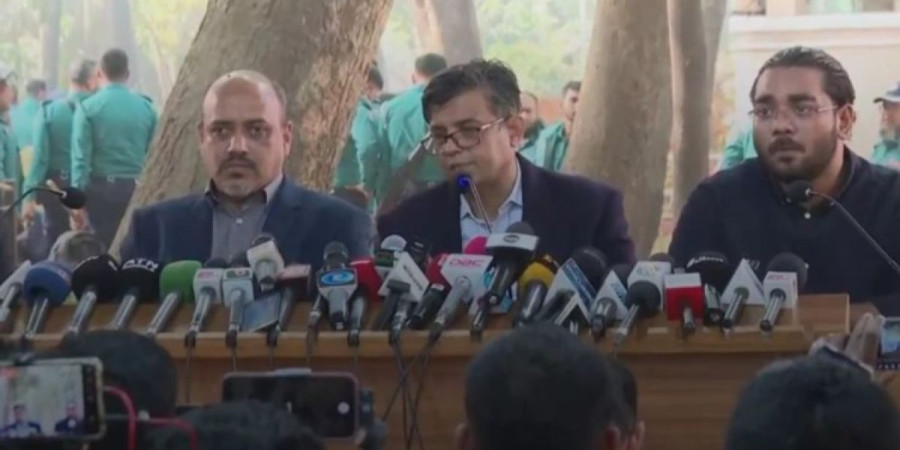
ছবি: Photo: Collected
The timing of the upcoming national elections in Bangladesh, whether it will be held by the end of this year or by June next year, depends on the implementation of the July Charter, according to Shafiqul Alam, the Press Secretary of the Chief Adviser of the interim government.
On Wednesday, following the submission of reports from the Judicial and Administrative Reform Commissions to Chief Adviser Professor Muhammad Yunus at the State Guest House Jamuna, Shafiqul Alam briefed the press, revealing key recommendations from the reports.
When asked about the current government's stance on the implementation of reforms suggested by various political parties in light of upcoming elections, Alam clarified that the Chief Adviser had consistently emphasized the importance of the six major reform commissions’ recommendations. A consensus commission, led by the Chief Adviser, has been formed to work on these recommendations, with Professor Dr. Ali Riaz serving as the Vice-Chairman. The commission aims to meet with political parties and civil society to assess which reforms need to be prioritized and which can be addressed later, along with identifying those that require constitutional changes.
Shafiqul Alam further explained that political parties would sign off on the agreed-upon reforms, which would lead to the formulation of the July Charter. The implementation of this charter would depend on both the current and subsequent governments. The completion of the reforms outlined in the charter would directly influence whether the national elections would take place by December this year or by June next year.
Four of the six reform commissions had already submitted their reports by the end of December, and on Wednesday, the Judicial and Administrative Reform Commissions submitted their findings.
Proposals for Judicial Independence
Alam shared that one of the key proposals from the Judicial Reform Commission was to establish full and effective independence for the judiciary. He noted that, while previous governments had claimed the judiciary in Bangladesh was independent, it had never truly been so. The new report suggests practical steps for achieving judicial independence, including proposals for greater transparency in the judicial appointment process. The report is extensive, spanning 351 pages, and some of its recommendations would require constitutional reforms.
Permanent Attorney Service
A significant recommendation from the Judicial Reform Commission is the establishment of a permanent attorney service in Bangladesh. Alam explained that in many countries, such a system exists, and in Bangladesh, this would help eliminate the current practice of political parties appointing loyalists as public prosecutors. Under the new recommendation, recruitment for the attorney service would follow a system similar to the BCS exams, ensuring that the appointees are selected based on merit rather than political allegiance.
He emphasized that this move would address issues in the criminal justice system, where 40 percent of cases are filed by the government but often end up being handled by the police, who may manipulate or influence the investigations. The establishment of a permanent attorney service is seen as a step toward improving the integrity of legal proceedings in the country.
Independent Investigation Agency
Another important recommendation from the report is the creation of an independent investigation agency. Alam pointed out that in Bangladesh, police are often tasked with investigating crimes, but in many cases, political parties have used police forces to influence investigations. This has led to biased and politically motivated inquiries, which has tainted many high-profile cases in the country. Establishing an independent investigation body is seen as crucial to ensuring that investigations are fair, unbiased, and free from political interference.
Additionally, the report proposes setting up permanent benches of the Supreme Court in divisional cities to address the growing population and increasing legal demands across the country. Alam noted that the High Court, which has remained in the same location since 1971, needs to be expanded to accommodate the growing number of cases, especially as the rural population is increasingly engaging in legal matters.
Legal Aid Expansion
The report also emphasizes the need to expand legal aid services, particularly in rural areas where legal support is currently insufficient. Alam highlighted that as villages grow and modernize, the frequency of legal disputes also rises, which makes it crucial to ensure that legal assistance reaches all corners of the country.
Finally, the report includes a policy recommendation concerning the involvement of lawyers in politics, suggesting the development of a framework to regulate their participation to ensure that the legal profession remains independent from political influence.
repoter






